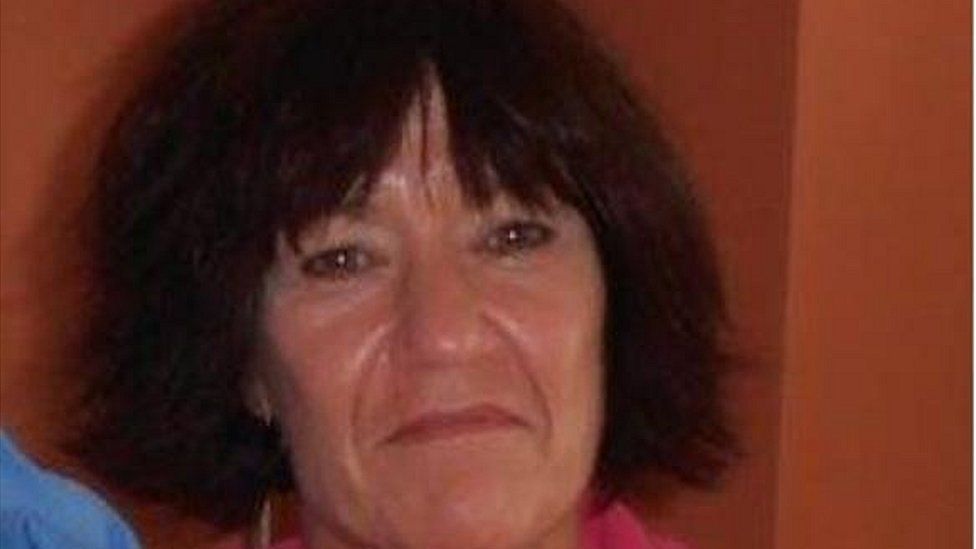Diane Douglas: Agencies 'lacked curiosity' in domestic abuse case
- Published

Diane Douglas was aged 56 when she was reported missing by family members in October 2021
Opportunities were missed to prevent the death of a vulnerable woman, a safety review has found.
The body of Diane Douglas, 56, was found buried in the grounds of her home in Colton, near Norwich, in November 2021.
A Domestic Homicide Review (DHR) found she had been "coercively controlled" by her partner Stuart Williamson.
Williamson, who was arrested for her murder, took his own life while on remand in December 2021.
The report, commissioned by Norfolk Community Safety Partnership, external, examined the responses of different agencies and the support offered to Ms Douglas - who is referred to as "Helen" - prior to her death.
It found a lack of "professional curiosity" in potential domestic abuse situations.
Ms Douglas, who had the degenerative condition Huntington's Disease, was last seen by her family in September 2018.
In October 2021, her nephew contacted police with concerns about her safety, after Williamson told family members who knocked on her door that she had left him 18 months before.
Her body was discovered in a shallow grave and had been there for a number of years, the report said.
Diane Douglas' body was found buried in a shallow grave in Colton near this property
A post mortem examination found severe traumatic head injuries consistent with being repeatedly struck with a heavy blunt object.
An inquest revealed Williamson had used her phone to send her family text messages after killing her.
'Isolation'
The pair first moved in together in 2007 and soon afterwards, Ms Douglas was diagnosed with Huntington's Disease, a progressive illness which affects walking, talking and swallowing.
They split in 2008, but reunited in 2016, moving to rural Norfolk where Williamson became her official carer.
The review said: "[Williamson] exacerbated this isolation by placing her in a home which was miles from anywhere, by making it awkward for her to visit friends and family, by making it awkward for them to visit her, and by dwindling away her savings and income on his lifestyle, which [her] family described as extravagant."
He spent more than £35,000 of her savings, and continued to spend her private pension and welfare benefits totalling £80,000 after her death, the review found.
Stuart Williamson was found dead in his prison cell on 29 December 2021
The review found that in July 2015, after qualifying for personal independence payments, Ms Douglas contacted adult social care at Norfolk County Council for an assessment, citing deterioration of her condition and asking about sheltered accommodation.
It was deemed "low priority" - and she moved in with Williamson in early 2016.
The DHR said: "The timing of this move, and the subsequent bank transfers from her savings into his account, was an act of financial abuse which was largely invisible and which continued after [her] death."
In July 2016, a neurology appointment in Cambridge put her independence score at 80%, meaning she needed support with chores and sorting finances and work adaptations.
She was also given medication after suffering a number of falls.
'Coercively controlling'
From December 2018, Ms Douglas failed to attend hospital appointments and a friend's lunch appointment was cancelled by text.
The DHR report said: "Although there were never any obvious signs of physical violence in the form of injuries.. she had been living with a coercively controlling man."
She had confided in her nephew about Williamson's financial abuse in August 2017, the review said, but efforts by him to reach out to adult social care were not "responded to adequately".
The review found specialist clinics in Cambridge did not then have a policy regarding routine enquiries about domestic abuse, "considering the vulnerabilities of patients with degenerative illnesses such as Huntington's", the review added.
The DHR identified a learning need to be curious about vulnerable people if they failed to attend medical reviews.
Adult social care services accepted there was a missed opportunity to engage with Ms Douglas more fully and to thoroughly explore the allegations raised by her nephew about financial and possible emotional abuse.
The review concluded health professionals were uniquely placed to ask about domestic abuse and advised all practitioners must be trained in domestic violence and abuse.
The DHR found agencies involved in the review identified learning in this area, much of which had already been implemented, or started, since Ms Douglas' death.
This now included working closely with domestic abuse services.
Norfolk Safeguarding Adult Board said training in "professional curiosity" and domestic abuse was being offered to a wider range of staff.
Got a story? Email eastofenglandnews@bbc.co.uk, external or WhatsApp 0800 169 1830
Related Topics
- Published22 December 2022
- Published3 November 2021
- Published3 November 2021